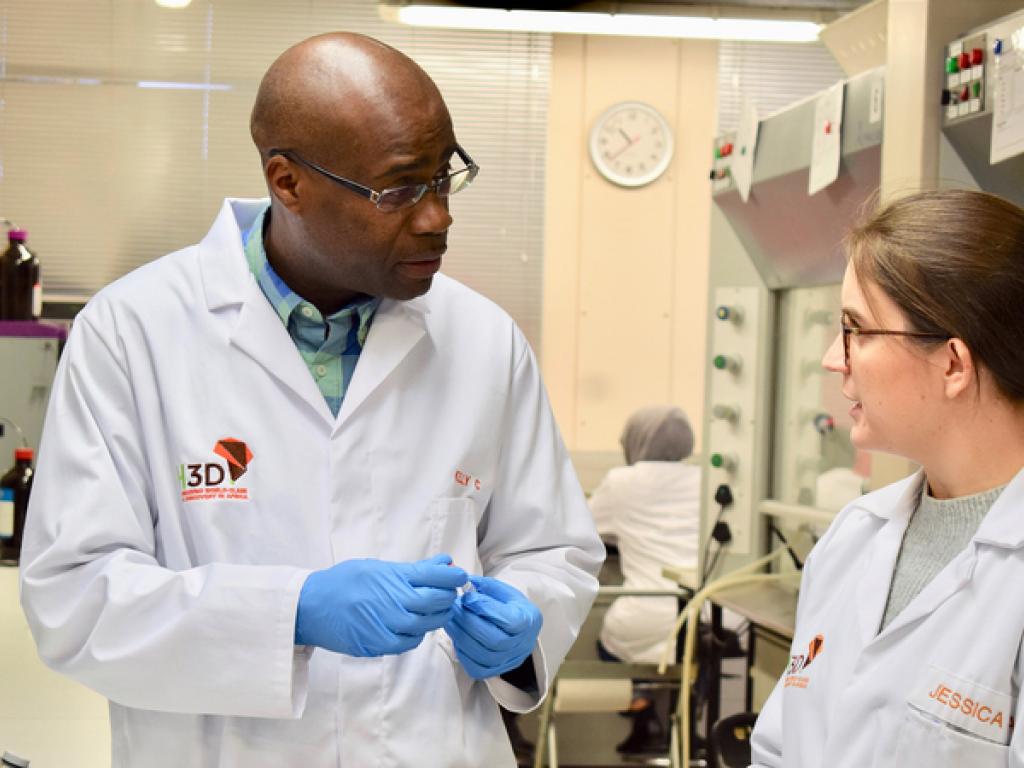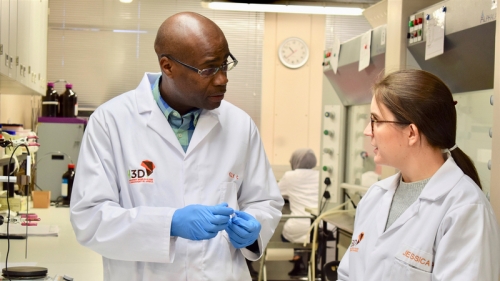Multimillion rand boost for Africa medicines research


H3D director Prof Kelly Chibale, who will hold the initial five-year Neville Isdell Chair in African-centric Drug Discovery and Development at UCT, in the laboratory with scientific officer Jessica Akester.
University of Cape Town (UCT) alumnus and former chairman and chief executive of Coca-Cola Neville Isdell has donated $1 242 160 (about R18 million) towards research into the discovery of new medicines for infectious diseases at the university’s Drug Discovery and Development Centre (H3D).
The generous donation will be used to establish an initial five-year Neville Isdell Chair in African-centric Drug Discovery and Development at H3D. H3D’s director and founder Professor Kelly Chibale will hold the Chair, which includes the directorship of H3D.
Through the donation, Isdell, who took the world’s largest beverage company to new heights during his tenure, will support solution-orientated research to create life-saving health innovations.
“I am excited about playing a part in helping to achieve African solutions to public health challenges on the continent and across the world. I hope this support will help Professor Chibale to drive and lead innovative research & development [R&D] of new malaria medicines, as well as new tuberculosis [TB] and antimicrobial resistance treatments, and train a new generation of African scientists with key modern pharmaceutical skills required to discover modern medicines,” Isdell said.
The donation will be used partly to lead efforts in establishing the H3D African Drug Metabolism and Disposition Project, also known as the H3D “African Liver Project”. This will focus on addressing the issue of variability in drug response across African populations, which is mostly driven by genetic differences in the expression and activity of drug-metabolising enzymes.
Prioritising drug candidates
Chibale said the aim is to develop and validate a preclinical discovery tool that can be used to prioritise drug candidates during their chemical lead optimisation phase based on the predicted pharmacological profile in African patients.
“The African Liver Project will also make H3D a unique centre of excellence where scientists from the global north and Africa will work hand in hand to better understand genetic variability in diverse African populations.”
“In addition to providing useful data for targeted clinical trial design, and eventually for the establishment of better directed drug dosage and dosage intervals, the African Liver Project will also make H3D a unique centre of excellence where scientists from the global north and Africa will work hand in hand to better understand genetic variability in diverse African populations,” Chibale explained.
UCT Vice-Chancellor Professor Mamokgethi Phakeng said the generous donation and establishment of the Chair is an endorsement of the pioneering research and work being done by H3D, and will help to expand its potentially life-saving work within Africa.
“Because of H3D’s initial achievements, the [chair-holder] will be extremely well placed to assume a leadership role in finding effective solutions to the discovery of life-saving innovative new medicines. The post will be powerfully placed for guiding thinking, discussion and decision-making on the African continent.
“Its impact will be both wide-ranging and novel since H3D is the first and only one of its kind on the African continent, and one of the rare integrated drug discovery and development centres set up within an academic environment worldwide.”
Potential malaria drug
H3D already has a potential drug for malaria in human trials. The potent anti-malarial clinical development candidate has the potential to cure, block transmission and protect in a single dose.
The H3D portfolio also includes projects targeting TB drug discovery and is expanding to address the serious threat of antimicrobial resistance, in part driven by hospital infections resistant to conventional antibiotics.
Chibale said the funding will be put to extremely good use at H3D, which was launched eight years ago, and has grown from a staff of four scientists to the current 60.
“Should H3D continue to be successful, it could result in the beginning of a home-grown pharmaceutical R&D industry that would focus on the unmet medical needs of African populations.”
“H3D will need sustainable funding at critical mass if it is to succeed. Should H3D continue to be successful, it could result in the beginning of a home-grown pharmaceutical R&D industry that would focus on the unmet medical needs of African populations and create high-skilled jobs for African scientists.”
Last year, Chibale was named as one of Fortune magazine’s “50 World’s Greatest Leaders” for 2018 for his pivotal work. He was also included in the magazine’s annual list of “influential figures we admire most”, and was featured prominently in the Financial Times twice within the first quarter of 2019.
He is a South African National Research Foundation A-rated scientist. Researchers holding an A rating are recognised internationally as leading scholars in their field, who consistently produce high-quality outputs with a measurable impact.
Isdell was born in Ireland and raised in Zambia, Chibale’s home country. He pursued a BSocSc degree at UCT before joining Coca-Cola in Zambia in 1966. He worked for the company in 11 countries across the globe before rising to become chairman and chief executive.
He has served on the boards of big corporates, including General Motors, as well as non-profits such as the World Wildlife Fund (WWF) USA and the Peace Parks Foundation. This year, he was named as the president of the 137-year-old UCT Rugby Football Club.
A talented rugby player in his youth, Isdell donated $1 million to the club in 2011, which was used to fund the UCT Neville Isdell Rugby Centre. This is in addition to his funding of the Smuts Hall Neville Isdell Leadership Camp over the past few years, a commitment he has recently renewed for another five years.
Story and Photo: Kim Cloete
